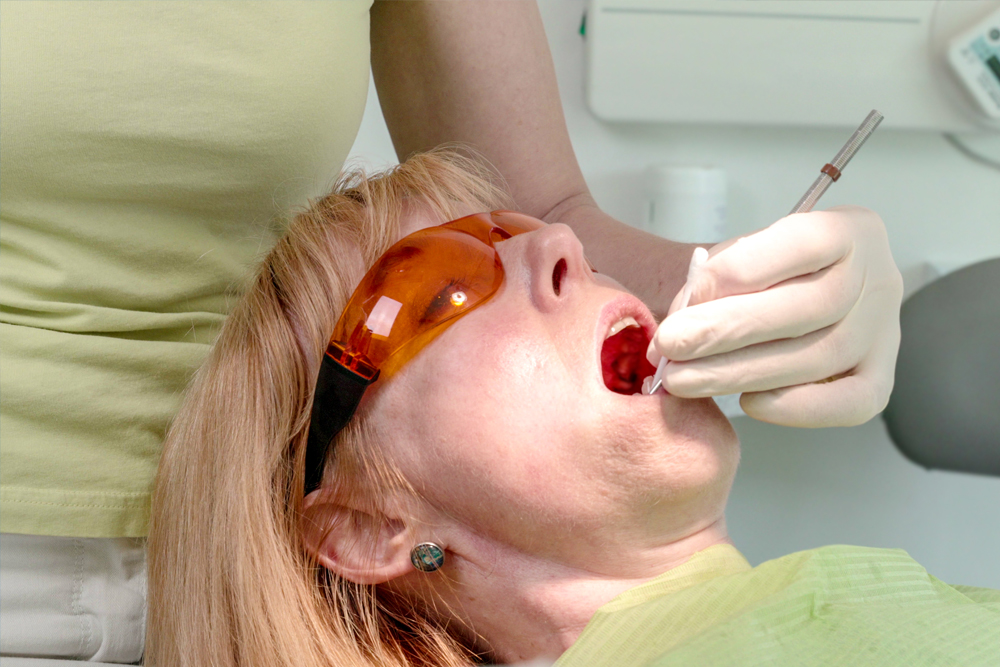

Numbing gel
Often, if the patient cannot overcome their phobia themselves, dentists will recommend using a numbing gel to reduce the pain and to give the patient enhanced peace of mind as they mentally prepare themselves for treatment.
Not all dental phobics are able to cure their phobia. Therefore, it is often necessary to find a dentist who advertises themselves as a specialist in treating dental phobic patients. These sorts of dentists will offer lots of different solutions, products and treatments to ensure that phobic patients are able to enjoy the same level of treatment as other patients.
For many patients, their dental phobia revolves around a fear of pain, injections and anaesthetic. Often, if the patient cannot overcome their phobia themselves, dentists will recommend using a numbing gel to reduce the pain and to give the patient enhanced peace of mind as they mentally prepare themselves for treatment.
What is Numbing Gel?
‘Numbing Gel’ is the patient-friendly name for Topical Anaesthesia. If you are phobic about dental pain, about needles or about injection, you dentist can apply numbing gel to your gums before the injection. This helps to reduce the pain of the needle as it enters the tissue.
Is it effective?
A topical anaesthetic is a type of anaesthetic that is specially designed for external application, rather than working internally and therefore needing to be injected via a syringe. For complex dental work, you may still need a local anaesthetic via an injection. However, the numbing gel should help you to relax and feel more comfortable about facing a needle – as well as removing any pain.
Do most dentists use Numbing Gel?
Some do and some don’t. What most patients don’t always realise is that injecting local anaesthetic into a gum is a tricky skill – especially if the injection needs to go into an awkward spot. It is especially tricky if the patient is anxious, nervous or tense because they are suffering from dental phobia. If you are uptight, it is much harder for the dentist to relax too. Therefore, you will experience more pain depending on the skill of your dentist. For some patients, especially patients who suffer from a phobia and struggle to relax in the dental practice, the solution could be to try a different dentist. There are lots of dentists who do not use numbing gel because they can deliver virtually pain-free injections anyway.
Regardless of the skills of their dentist, the fact is that some patients simply feel more confident if numbing gel is applied first. You can ask your dentist about this. Alternatively, you can try visiting a dentist that specialises in pain-free procedures which will include the use of products like numbing gels.
Can you be allergic to numbing gels?
The anesthetic agent in numbing gel is usually benzocaine, which is actually found in a wide range of products such as throat lozenges, sunburn remedies, burn remedies and creams for treatment of skin irritations, such as caused by poison ivy for example.
Some people are allergic to benzocaine but it is rare that it results in a serious allergic reaction. Most reactions include inflammation, rashes or dermatitis.
If you are concerned about being allergic to numbing gel, it is important to make sure that your dentist tests you prior to applying it properly. Normally, dentists will test for an allergic reaction by applying a small amount of petrolatum to the skin which contains 5% benzocaine. Numbing gel used for dental procedures contains 20% benzocaine.
Are some people immune to numbing gel?
Sometimes, people claim to be immune to numbing gel and even to anaesthetic. There are a number of reasons for this. But the fact is that very, very few people are actually ‘immune’.
Firstly, and most importantly, numbing agents take a period of time to work effectively. So rather than being immune to its analgesic power, you most likely just need to be more patient and give it the time work its magic. If you are in a busy practice where there is a lot of pressure to see patients, it could be that your dentist does not allow enough time for the gel to work. This is why it is so important for dental phobic patients to talk to their dentist and explain their condition – after all, while you suffer in silence, your dentist may see you as an ordinary patient happy to undergo a relatively simple procedure.
One of the other reasons for people believing that numbing gel does not work is because their phobia makes them imagine the worst case scenario. With a phobia, your fears are exaggerated and irrational. There is no reason why the numbing gel should not work. But in your mind, you are already convincing yourself that it hasn’t. The more you think about it, the less numb you feel. As you become more anxious, more stressed and more worried, your awareness of your vulnerability heightens. The numbing gel may have worked fine. But your phobia has stopped you from believing in it.
Can numbing gel be used for children?
Many children develop dentophobia because they find the dentist intimidating, the environment unfriendly and the treatment painful. Numbing gel is safe to use in pediatric dentistry and can be an effective way of allowing the dentist to complete the appropriate procedure. Because the gel needs time to work, it can also help to slow down treatment, giving the patient time to relax and the dentist time to apply broader behavioural management techniques.
Numbing gel is also good to use on younger patients because it comes into a variety of types and flavours. For example, as well as a gel it can be applied as a spray. And if a child doesn’t like the taste of the anaesthetic, flavours like cherry and banana make it a lot more palatable. A choice of flavours can also help to distract a younger patient from thinking about the actual treatment.

